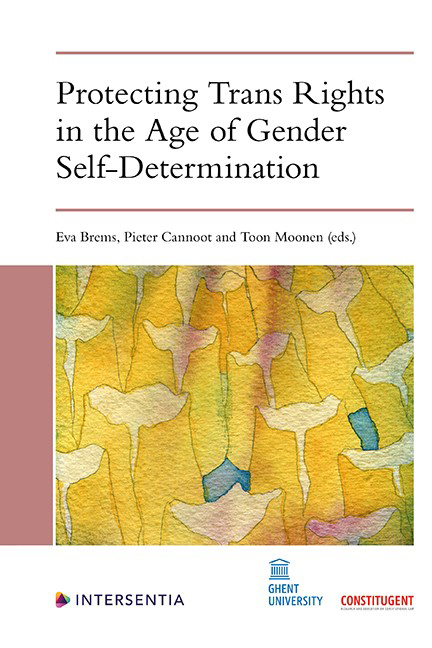Book contents
- Frontmatter
- Contents
- List of Cases
- List of Authors
- Introduction
- The Limits to Gender Self-Determination in a Stereotyped Legal System: Lessons from the Belgian Gender Recognition Act
- From Assigning Sex to Affirming Gender: Remarks on an Ongoing Evolution Affecting Gender Identification
- The Insufficiency of Gender Recognition Acts: The Example of Schooldays in Norway
- Developments in German Civil Status Law on the Recognition of Intersex and Non-Binary Persons: Subversion Subverted
- Framing Equality: Debating Protected Grounds in the Field of Trans and Non-Binary Rights
- ‘True Sex’: The Law and Confirmation of One’s Sex
- Index
- About the Editors
From Assigning Sex to Affirming Gender: Remarks on an Ongoing Evolution Affecting Gender Identification
Published online by Cambridge University Press: 11 February 2021
- Frontmatter
- Contents
- List of Cases
- List of Authors
- Introduction
- The Limits to Gender Self-Determination in a Stereotyped Legal System: Lessons from the Belgian Gender Recognition Act
- From Assigning Sex to Affirming Gender: Remarks on an Ongoing Evolution Affecting Gender Identification
- The Insufficiency of Gender Recognition Acts: The Example of Schooldays in Norway
- Developments in German Civil Status Law on the Recognition of Intersex and Non-Binary Persons: Subversion Subverted
- Framing Equality: Debating Protected Grounds in the Field of Trans and Non-Binary Rights
- ‘True Sex’: The Law and Confirmation of One’s Sex
- Index
- About the Editors
Summary
INTRODUCTION
This chapter makes use of the Belgian legal framework to illustrate one of the latest stages of an ongoing evolution that affects the way many Western countries deal with the gender identification of trans people. The expression ‘gender identification’ refers to the various rules that have been established by the State to determine the gender of a person (not their sex) and to express it on official documents. Indeed, one of the main results of a comparative legal research recently conducted on civil status by the author of this chapter and other researchers was the finding that, conceptually speaking, more and more countries are in the process of leaving aside a system where gender identification is made on the basis of the sex assigned at birth, to a system where it depends on one‘s self-affirmation of gender identity. There is therefore what has been called a movement from assigning sex to affirming gender. However, in most countries, including Belgium, this shift is incomplete, since in many cases people cannot simply affirm their gender and have it recognised by the State. To the contrary, they have to go through specific administrative or judicial procedures, which contain legal or practical obstacles to this recognition; the number of changes can be limited and it is ofter impossible to have at the same time a different gender marker depending on the situation, which may be problematic for people who have a fluid gender. The number of markers is also ofter limited, even in legal systems where non-binary genders are recognised. The possibility of not having a gender identity is almost never recognised. This chapter reflects on this ongoing shift, tries to understand why it is occurring, why countries like Belgium that are very much advanced in the protection of trans people‘s human rights are still currently not able to complete it and how it could be finalised in a simple and efficient way, all for the better good of society, especially its trans members.
- Type
- Chapter
- Information
- Publisher: IntersentiaPrint publication year: 2020



